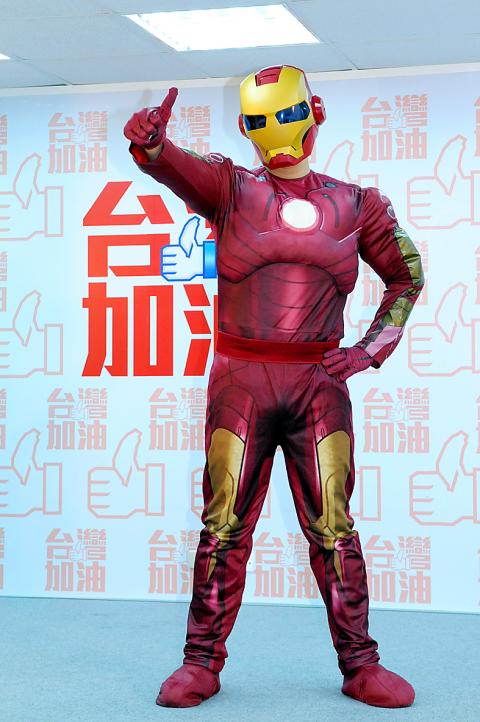The issue of identity re-entered the presidential campaign yesterday after President Ma Ying-jeou (馬英九) defined himself as “Taiwanese” in response to a campaign slogan introduced by Democratic Progressive Party (DPP) Chairperson and presidential candidate Tsai Ing-wen (蔡英文) last week that highlights her intention to enhance her public identification as Taiwanese.
Writing on his Facebook page, Ma, who is seeking re-election in January next year, dismissed Tsai’s accusations that he was undermining the nation’s sovereignty and identity, saying he identified himself as Taiwanese and a citizen of the Republic of China (ROC).
“I am a descendant of the Yellow Emperor in blood and I identify with Taiwan in terms of my identity. I fight for Taiwan and I am Taiwanese,” Ma wrote. “In nationality, I am an ROC citizen and I am the president of the ROC.”

Photo: CNA
Tsai last week introduced her “I am a Taiwanese” campaign slogan, which follows up her two earlier slogans “Taiwan NEXT” and “Taiwan, what do you want?”
Tsai has vowed to devote more resources toward enhancing Taiwanese recognition in the international community if the DPP regains the presidency next year. At a campaign event on Friday last week, she accused Ma and the government of damaging the nation’s sovereignty and identity, adding that the president “finds it difficult to say the word ‘Taiwanese’ out loud.”
Ma’s posting was in contrast with a posting by New Party Chairman Yok Mu-ming (郁慕明) on Monday, who clearly identified himself as Chinese.

Photo: CNA
“I am Yok Mu-ming and I am Chinese,” the head of the New Party, which is closely aligned with the Chinese Nationalist Party (KMT), wrote in a text message sent to reporters.
Amid tensions between the People First Party, another party in the pan-blue camp, and the KMT over cooperation in the legislative elections, Yok said Ma, who doubles as KMT chairman, and Tsai should clarify their stance on national identity and he urged the two parties to defend the ROC.
Ma campaign office spokesman Yin Wei (殷瑋) said “one China, with each side having its own interpretation” was the Ma administration’s constant position and that “one China” referred to the ROC.
Also yesterday, Ma’s campaign office introduced four members who will focus on Ma’s online election campaign via social networking platforms including YouTube, Facebook, Google+ and Plurk.
Yin said the four members, who are all in their 30s, would work with the team to promote campaign events via the Internet and allow younger voters to learn more about Ma and his campaign platform, and to communicate with the president in a more creative and direct way.

ENDEAVOR MANTA: The ship is programmed to automatically return to its designated home port and would self-destruct if seized by another party The Endeavor Manta, Taiwan’s first military-specification uncrewed surface vehicle (USV) tailor-made to operate in the Taiwan Strait in a bid to bolster the nation’s asymmetric combat capabilities made its first appearance at Kaohsiung’s Singda Harbor yesterday. Taking inspiration from Ukraine’s navy, which is using USVs to force Russia’s Black Sea fleet to take shelter within its own ports, CSBC Taiwan (台灣國際造船) established a research and development unit on USVs last year, CSBC chairman Huang Cheng-hung (黃正弘) said. With the exception of the satellite guidance system and the outboard motors — which were purchased from foreign companies that were not affiliated with Chinese-funded

PERMIT REVOKED: The influencer at a news conference said the National Immigration Agency was infringing on human rights and persecuting Chinese spouses Chinese influencer “Yaya in Taiwan” (亞亞在台灣) yesterday evening voluntarily left Taiwan, despite saying yesterday morning that she had “no intention” of leaving after her residence permit was revoked over her comments on Taiwan being “unified” with China by military force. The Ministry of the Interior yesterday had said that it could forcibly deport the influencer at midnight, but was considering taking a more flexible approach and beginning procedures this morning. The influencer, whose given name is Liu Zhenya (劉振亞), departed on a 8:45pm flight from Taipei International Airport (Songshan airport) to Fuzhou, China. Liu held a news conference at the airport at 7pm,

Taiwan was ranked the fourth-safest country in the world with a score of 82.9, trailing only Andorra, the United Arab Emirates and Qatar in Numbeo’s Safety Index by Country report. Taiwan’s score improved by 0.1 points compared with last year’s mid-year report, which had Taiwan fourth with a score of 82.8. However, both scores were lower than in last year’s first review, when Taiwan scored 83.3, and are a long way from when Taiwan was named the second-safest country in the world in 2021, scoring 84.8. Taiwan ranked higher than Singapore in ninth with a score of 77.4 and Japan in 10th with

Authorities yesterday elaborated on the rules governing Employment Gold Cards after a US cardholder was barred from entering Taiwan for six years after working without a permit during a 2023 visit. American YouTuber LeLe Farley was barred after already being approved for an Employment Gold Card, he said in a video published on his channel on Saturday. Farley, who has more than 420,000 subscribers on his YouTube channel, was approved for his Gold Card last month, but was told at a check-in counter at the Los Angeles International Airport that he could not enter Taiwan. That was because he previously participated in two